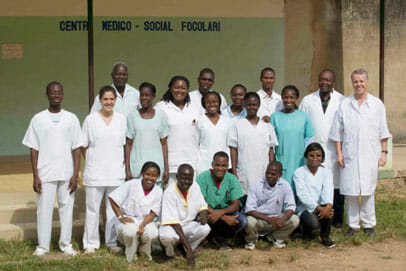
Jun 29, 2015 | Focolare Worldwide
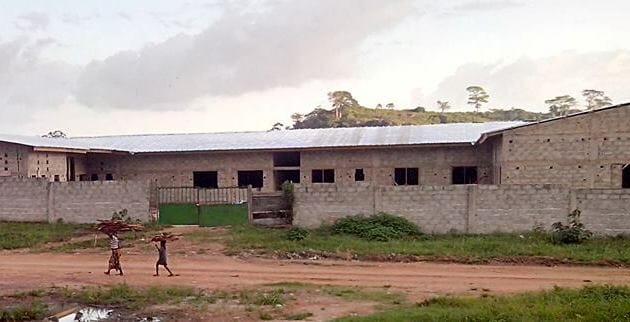 Estelle is the eldest of eight brothers, in a family from Ivory Coast who, after having worked as a secretary at a medical clinic in Abidjan, moved to Man in 2006 where she volunteers especially as a contact person with sponsors of a medical centre run by the Focolare Movement. When the project finished, she decided to expand her administrative skills. Meanwhile, her father died and she had to provide financial support for the family. She applied for and received a scholarship from Fraternity with Africa. Now, along with working, she is specializing through distance learning courses in “Administration of NGO organisations and non-profit associations” at university in Burkina Faso. After finishing her studies, with the support of a tutor and of AMU, she will travel to Burundi where she will complete one stage in administration and finance at CASOBU, an NGO that promotes human and community development through acitivites and projects based on the values of sharing and sustainable development. “It was a nice concrete experience for me, because it was the first time I travelled outside Ivory Coast and got to know other cultures and learn much from CASOBU; their approach to microcredit, for example. When I returned to my own country, I decided to propose that same microcredit model, beginning with the people I knew. We’ve already begun two groups that up until now seem to be functioning quite well. . .“ Everything she received, spurred Estelle to become involved in Fraternity with Africa: “When I finished my studies, I thought that since I couldn’t make a financial contribution, I could share my time and talents with the project.” So, on the one hand there was the work in adminstration, running and finances of the medical centre, and on the other hand keep up relationships, taking care of the adminstration and, from within the adminstration, she evaluates scholarship candidates and accompanies the students who receive them.
Estelle is the eldest of eight brothers, in a family from Ivory Coast who, after having worked as a secretary at a medical clinic in Abidjan, moved to Man in 2006 where she volunteers especially as a contact person with sponsors of a medical centre run by the Focolare Movement. When the project finished, she decided to expand her administrative skills. Meanwhile, her father died and she had to provide financial support for the family. She applied for and received a scholarship from Fraternity with Africa. Now, along with working, she is specializing through distance learning courses in “Administration of NGO organisations and non-profit associations” at university in Burkina Faso. After finishing her studies, with the support of a tutor and of AMU, she will travel to Burundi where she will complete one stage in administration and finance at CASOBU, an NGO that promotes human and community development through acitivites and projects based on the values of sharing and sustainable development. “It was a nice concrete experience for me, because it was the first time I travelled outside Ivory Coast and got to know other cultures and learn much from CASOBU; their approach to microcredit, for example. When I returned to my own country, I decided to propose that same microcredit model, beginning with the people I knew. We’ve already begun two groups that up until now seem to be functioning quite well. . .“ Everything she received, spurred Estelle to become involved in Fraternity with Africa: “When I finished my studies, I thought that since I couldn’t make a financial contribution, I could share my time and talents with the project.” So, on the one hand there was the work in adminstration, running and finances of the medical centre, and on the other hand keep up relationships, taking care of the adminstration and, from within the adminstration, she evaluates scholarship candidates and accompanies the students who receive them.  The medical centre in Man began in 2002, during the civil war when the hospital was closed. It was hosted in an apartment with three rooms. Then, in 2008, the current Social Medical Centre was opened with visiting rooms, one-day recovery rooms, pharmacy and laboratory. But now the number of patients has gown so much that a new centre is being constructed where diagnostic facilities will be added, and programmes for the reduction of infant malnutrition in the region of Man. There will also be training programmes for mothers, in the field of nutrition. The health situation of the people in Man is problematic. Medical bills are paid in advance and without the possiblity of riembursement. Given the poverty of the population, families are generally able to cover the cost of food and school fees. But if illness comes knocking, they only go the doctor when the illness is at its worst, and the patient is dying. The new medical centre will be able offer medical care to six thousand adult patients and three thousand children. See: AMU notizie 2/2015
The medical centre in Man began in 2002, during the civil war when the hospital was closed. It was hosted in an apartment with three rooms. Then, in 2008, the current Social Medical Centre was opened with visiting rooms, one-day recovery rooms, pharmacy and laboratory. But now the number of patients has gown so much that a new centre is being constructed where diagnostic facilities will be added, and programmes for the reduction of infant malnutrition in the region of Man. There will also be training programmes for mothers, in the field of nutrition. The health situation of the people in Man is problematic. Medical bills are paid in advance and without the possiblity of riembursement. Given the poverty of the population, families are generally able to cover the cost of food and school fees. But if illness comes knocking, they only go the doctor when the illness is at its worst, and the patient is dying. The new medical centre will be able offer medical care to six thousand adult patients and three thousand children. See: AMU notizie 2/2015
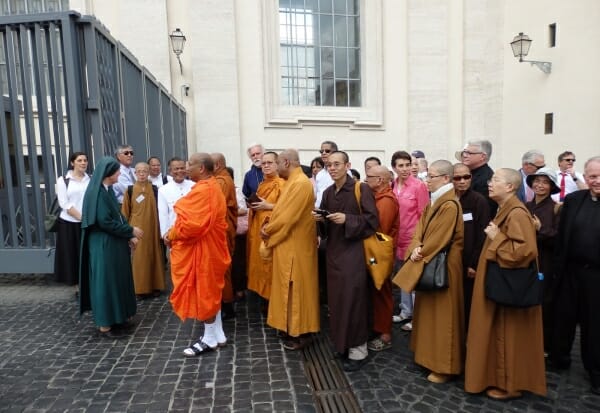
Jun 25, 2015 | Focolare Worldwide
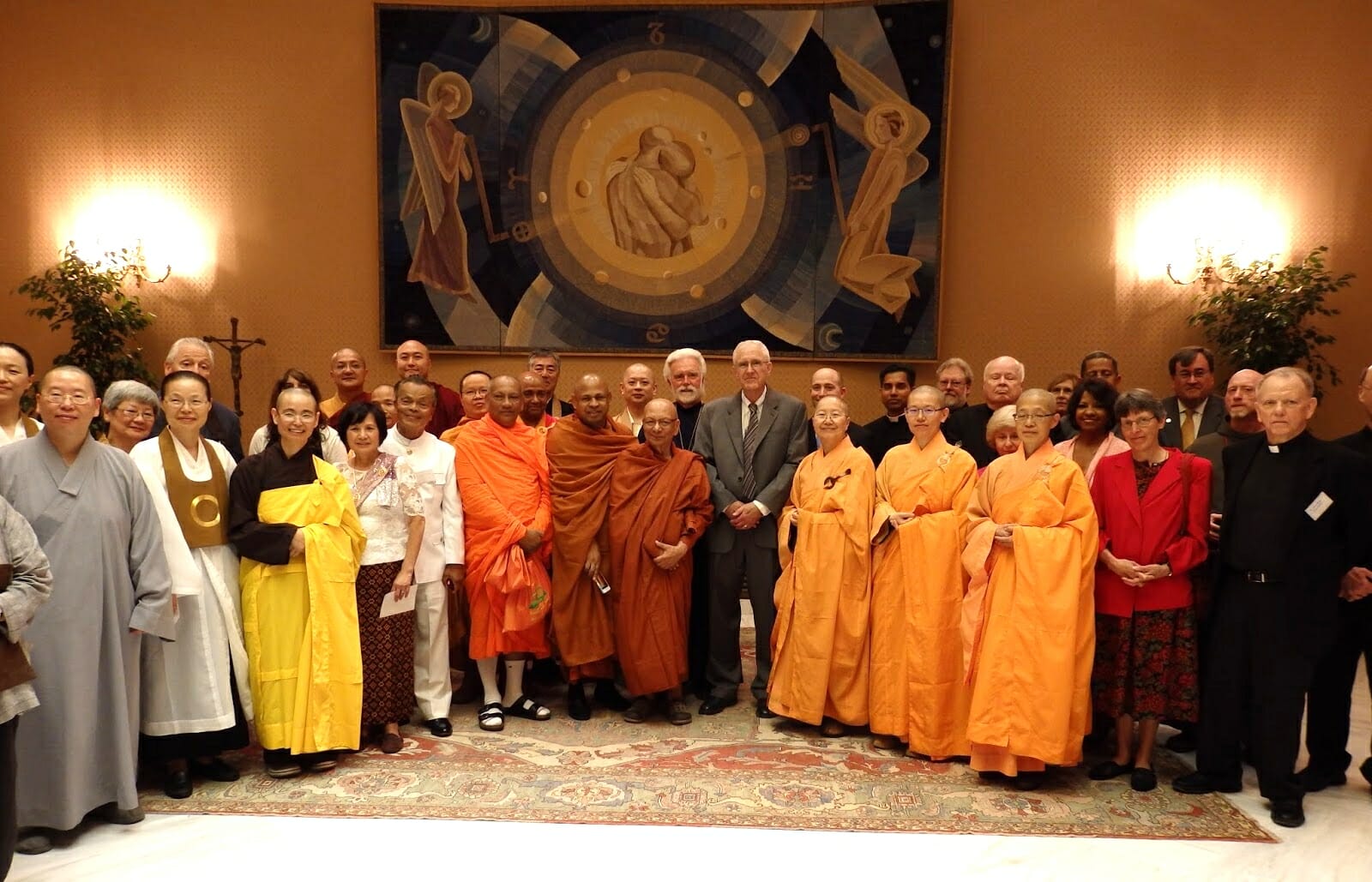 Buddhists and Catholics from the United States are holding an interreligious dialogue meeting for the first time near Rome this week, focused on the themes of ‘Suffering, Liberation and Fraternity’. The five day meeting, which opened on Tuesday at the headquarters of the Focolare Movement in Castelgandolfo, Italy, includes 46 Buddhist and Catholic participants from New York, Chicago, San Francisco, Los Angeles and Washington D.C. In an opening address to the group, which will meet with Pope Francis on Wednesday, the president of the Pontifical Council for Interreligious Dialogue, Cardinal Jean-Louis Tauran said “in a world where diversity is seen as a threat”, the encounter is “a sign of our openness towards one another and our commitment to human fraternity”. “We are all pilgrims”, he stressed, adding that the dialogue between Buddhists and Catholics is part of “our ongoing quest to grasp the mystery of our lives and the ultimate Truth”. To find out more about this dialogue, jointly sponsored by the PCID and the U.S. Bishops’ Committee for Ecumenical and Interreligious Affairs, Philippa Hitchen spoke to one of the Catholic participants, Fr Leo Lefebure, a theology professor at the Jesuit Georgetown University. Listen to audio recording Buddhists and Catholics from the United States are taking part in a meeting for the first time this week, focused on the themes of ‘Suffering, Liberation and Fraternity’. The five day event, which opened today (Tuesday) at the headquarters of the Focolare movement in Castelgandolfo, includes 46 Buddhist and Catholic participants from New York, Chicago, San Francisco, Los Angeles and Washington DC. In his opening address to the group, which will meet with Pope Francis on Wednesday, the president of the Pontifical Council for Interreligious Dialogue (PCID) Cardinal Jean-Louis Tauran said: “in a world where diversity is seen as a threat”, the encounter is “a sign of our openness towards one another and our commitment to human fraternity.” “We are all pilgrims”, he stressed, adding that the dialogue between Buddhists and Catholics is part of “our ongoing quest to grasp the mystery of our lives and the ultimate Truth”. The meeting is jointly sponsored by the PCID and the US Bishops’ Committee for Ecumenical and Interreligious Affairs. In an interview with Philippa Hitchens on Vatican Radio, one of the participants, Fr Leo Lefebure SJ, a theology professor at Georgetown University said the PCID asked the US Conference of Catholic Bishops to begin a new series of conversations focused on the theme of ‘Be friends and help the world’ so the dialogue will explore beliefs and ideas that “resonate across both traditions”, especially the concepts of ‘suffering and the end of suffering’.
Buddhists and Catholics from the United States are holding an interreligious dialogue meeting for the first time near Rome this week, focused on the themes of ‘Suffering, Liberation and Fraternity’. The five day meeting, which opened on Tuesday at the headquarters of the Focolare Movement in Castelgandolfo, Italy, includes 46 Buddhist and Catholic participants from New York, Chicago, San Francisco, Los Angeles and Washington D.C. In an opening address to the group, which will meet with Pope Francis on Wednesday, the president of the Pontifical Council for Interreligious Dialogue, Cardinal Jean-Louis Tauran said “in a world where diversity is seen as a threat”, the encounter is “a sign of our openness towards one another and our commitment to human fraternity”. “We are all pilgrims”, he stressed, adding that the dialogue between Buddhists and Catholics is part of “our ongoing quest to grasp the mystery of our lives and the ultimate Truth”. To find out more about this dialogue, jointly sponsored by the PCID and the U.S. Bishops’ Committee for Ecumenical and Interreligious Affairs, Philippa Hitchen spoke to one of the Catholic participants, Fr Leo Lefebure, a theology professor at the Jesuit Georgetown University. Listen to audio recording Buddhists and Catholics from the United States are taking part in a meeting for the first time this week, focused on the themes of ‘Suffering, Liberation and Fraternity’. The five day event, which opened today (Tuesday) at the headquarters of the Focolare movement in Castelgandolfo, includes 46 Buddhist and Catholic participants from New York, Chicago, San Francisco, Los Angeles and Washington DC. In his opening address to the group, which will meet with Pope Francis on Wednesday, the president of the Pontifical Council for Interreligious Dialogue (PCID) Cardinal Jean-Louis Tauran said: “in a world where diversity is seen as a threat”, the encounter is “a sign of our openness towards one another and our commitment to human fraternity.” “We are all pilgrims”, he stressed, adding that the dialogue between Buddhists and Catholics is part of “our ongoing quest to grasp the mystery of our lives and the ultimate Truth”. The meeting is jointly sponsored by the PCID and the US Bishops’ Committee for Ecumenical and Interreligious Affairs. In an interview with Philippa Hitchens on Vatican Radio, one of the participants, Fr Leo Lefebure SJ, a theology professor at Georgetown University said the PCID asked the US Conference of Catholic Bishops to begin a new series of conversations focused on the theme of ‘Be friends and help the world’ so the dialogue will explore beliefs and ideas that “resonate across both traditions”, especially the concepts of ‘suffering and the end of suffering’.  He noted that the basic values and virtues of Buddhists and Catholics “converge to a great degree” and there is a long history in the United States of leaders of both traditions coming together to oppose violence and work towards peaceful transformation of conflict. Fr Leo says that every major urban area in the US has large immigrant populations from Asia, so part of the Buddhist population is made up of these people. Another part includes people who have converted from other faiths, especially from Judaism and Christianity. What is sometimes controversial, he notes, is that some see themselves as ‘practitioners of both their religion of origin and some form of Buddhist tradition’. But many Catholics, he says, find their faith much enhanced by practices such as meditation – in a survey of Christians in the US who engage in some form of meditation, he says most found their own faith experience ‘profoundly deepened’ by these practices… Fr Leo says it was very significant that this meeting is taking place in the year that we mark the 50th anniversary of Nostra Aetate, the document that for the first time described Buddhism and said the Catholic Church “rejects nothing of what is true and holy” in these traditions, “implying there are things we can learn from them.” Source Vatican Radio
He noted that the basic values and virtues of Buddhists and Catholics “converge to a great degree” and there is a long history in the United States of leaders of both traditions coming together to oppose violence and work towards peaceful transformation of conflict. Fr Leo says that every major urban area in the US has large immigrant populations from Asia, so part of the Buddhist population is made up of these people. Another part includes people who have converted from other faiths, especially from Judaism and Christianity. What is sometimes controversial, he notes, is that some see themselves as ‘practitioners of both their religion of origin and some form of Buddhist tradition’. But many Catholics, he says, find their faith much enhanced by practices such as meditation – in a survey of Christians in the US who engage in some form of meditation, he says most found their own faith experience ‘profoundly deepened’ by these practices… Fr Leo says it was very significant that this meeting is taking place in the year that we mark the 50th anniversary of Nostra Aetate, the document that for the first time described Buddhism and said the Catholic Church “rejects nothing of what is true and holy” in these traditions, “implying there are things we can learn from them.” Source Vatican Radio
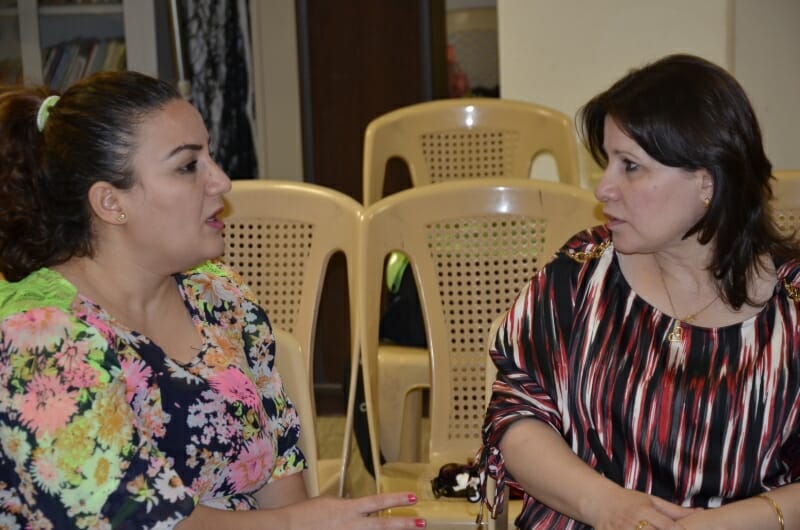
Jun 23, 2015 | Focolare Worldwide
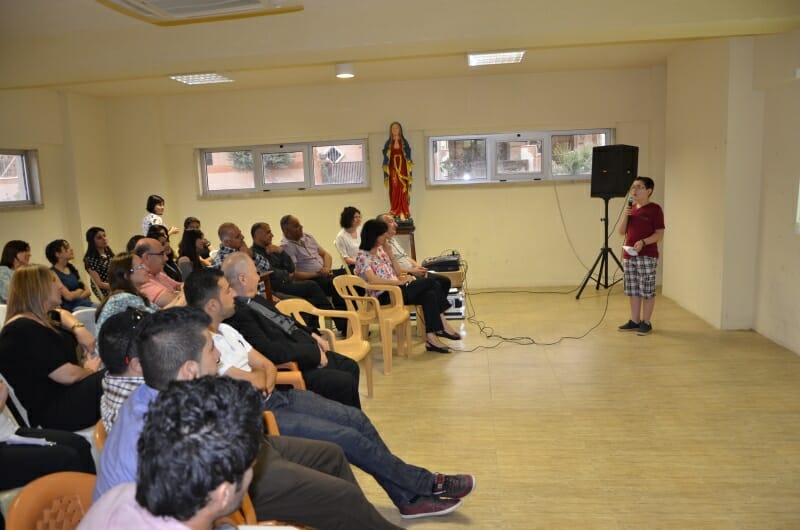 “Iraq is going through its worst period in ten years,” write Gemma and Pierre from the Focolare Movement in Jordan and Iraq, following their short trip to Erbil, Iraq. Their objective was to make the people there feel the closeness of the Focolare community that has been in that region for many years. “Being with them, even though we found them so tried and exhausted, we were struck by how their generosity towards others, and how they continue to believe in in God’s love.” “Nine months have passed since the villages of the Nineveh Plains were invaded by ISIS. The general situation of the country has worsened with recent developments, that is, the taking of new territories. The people, including our friends, feel a great sense of uncertainty about the future. Many have already fled the country and others are planning to do the same.” Spiritual closeness no small matter if, at the conclusion of the days together, one person confided: “We’ve lost everything, I wasn’t able to finish my university studies, there are no jobs . . . but finally, I have peace again, and I decided to begin my relationship with God again.” Pierre and Gemma recount: “During the meeting with the Focolare community there was one very important moment: it was when we openly declared our desire to give our lives for one another, to love each other with the measure of Jesus’s love, so that He could be present among us as He promises. Then we meditated on the link between the Eucharist and Church, using a 1982 talk by Chiara Lubich, The Eucharist makes the Church and the Church makes the Eucharist. We also met Archbishop Bashar Warda, Chaldean Catholic Archbishop of Erbil, who was pleased by our visit. In concluding he asked us to pray for Iraq like never before.”
“Iraq is going through its worst period in ten years,” write Gemma and Pierre from the Focolare Movement in Jordan and Iraq, following their short trip to Erbil, Iraq. Their objective was to make the people there feel the closeness of the Focolare community that has been in that region for many years. “Being with them, even though we found them so tried and exhausted, we were struck by how their generosity towards others, and how they continue to believe in in God’s love.” “Nine months have passed since the villages of the Nineveh Plains were invaded by ISIS. The general situation of the country has worsened with recent developments, that is, the taking of new territories. The people, including our friends, feel a great sense of uncertainty about the future. Many have already fled the country and others are planning to do the same.” Spiritual closeness no small matter if, at the conclusion of the days together, one person confided: “We’ve lost everything, I wasn’t able to finish my university studies, there are no jobs . . . but finally, I have peace again, and I decided to begin my relationship with God again.” Pierre and Gemma recount: “During the meeting with the Focolare community there was one very important moment: it was when we openly declared our desire to give our lives for one another, to love each other with the measure of Jesus’s love, so that He could be present among us as He promises. Then we meditated on the link between the Eucharist and Church, using a 1982 talk by Chiara Lubich, The Eucharist makes the Church and the Church makes the Eucharist. We also met Archbishop Bashar Warda, Chaldean Catholic Archbishop of Erbil, who was pleased by our visit. In concluding he asked us to pray for Iraq like never before.”  I have come for you, each one of you is like the whole world to me. . .” said Bishop Salomone Warduni, Auxiliary Bishop of Baghdad, from the Chaldean Catholic Church, who had travelled from Baghdad just to be at our gathering. He exhorted everyone: “Have no fear, carry on in the life of the ideal of unity, because each one of us has a mission to accomplish.” One person said: “I try live love in concrete ways until [love] becomes reciprocal within the community. In the Eucharist I find the strength to carry on loving.” Then there is the joy of being together. In spite of the situation there is very lively group children and teenagers who held a local edition of the Run4Unity sport relay for peace, with 35 boys and girls. “These were intense days for us,” conclude the two focolarini from Jordan, “a deep and divine experience. They gave much more to us than we were ever able to give to them. Who knows how much life must be coming from this suffering that is being lived in a Christian way.
I have come for you, each one of you is like the whole world to me. . .” said Bishop Salomone Warduni, Auxiliary Bishop of Baghdad, from the Chaldean Catholic Church, who had travelled from Baghdad just to be at our gathering. He exhorted everyone: “Have no fear, carry on in the life of the ideal of unity, because each one of us has a mission to accomplish.” One person said: “I try live love in concrete ways until [love] becomes reciprocal within the community. In the Eucharist I find the strength to carry on loving.” Then there is the joy of being together. In spite of the situation there is very lively group children and teenagers who held a local edition of the Run4Unity sport relay for peace, with 35 boys and girls. “These were intense days for us,” conclude the two focolarini from Jordan, “a deep and divine experience. They gave much more to us than we were ever able to give to them. Who knows how much life must be coming from this suffering that is being lived in a Christian way.
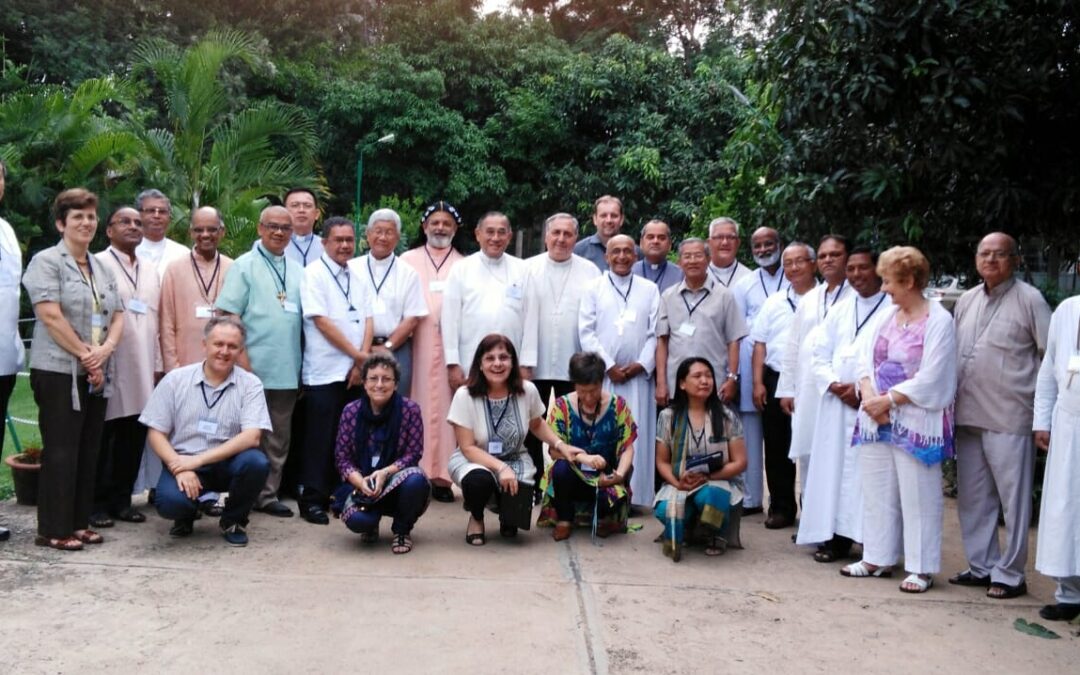
Jun 22, 2015 | Focolare Worldwide
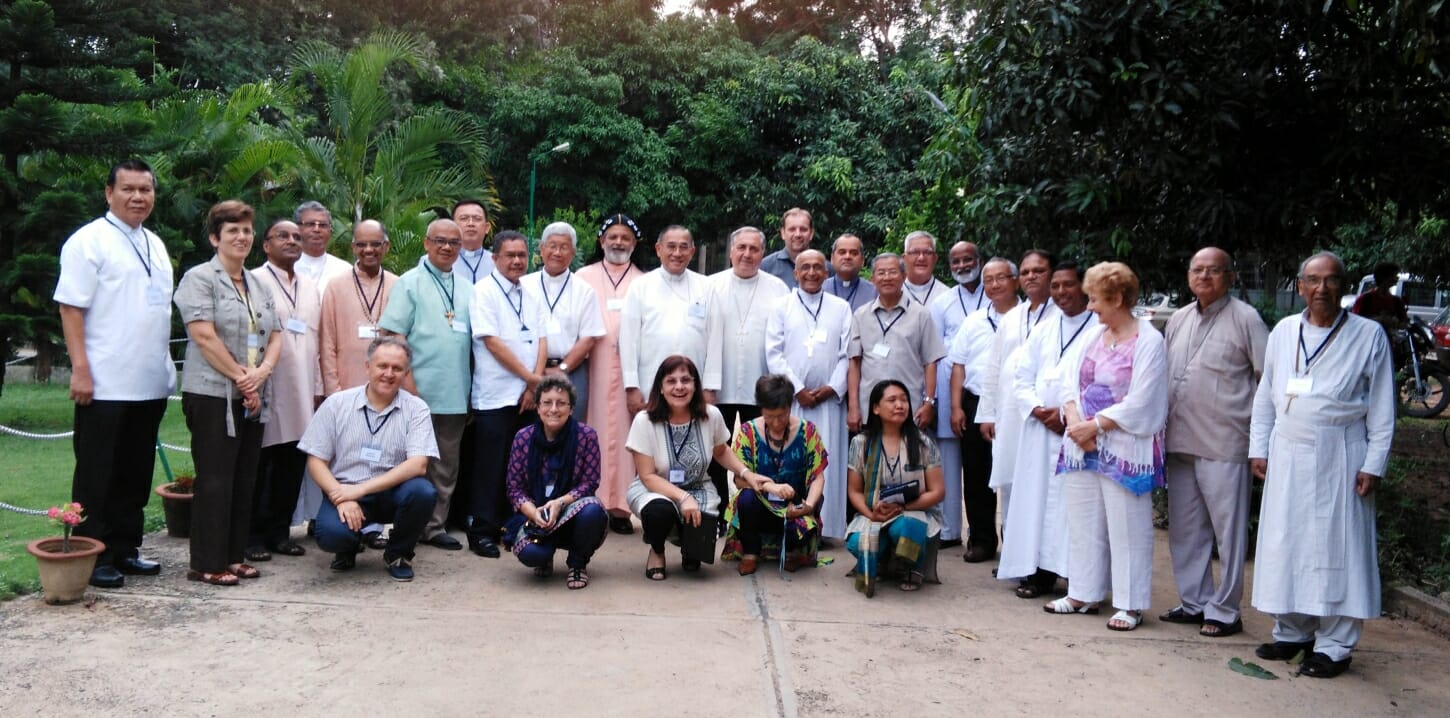 “Upon my arrival, the first person I saw was the cardinal who took my bag. The art of loving, which Chiara Lubich speaks about in such a simple way, is life.” So says Mons. Ignatius Mascarenhas, bishop of Chandigarh, India, one of the 22 Catholic Bishops-Friends of the Focolare Movement reunited in Bangalore from June 3rd to 6th for a pan-Asian meeting. For the first time, among these, there are 12 Indian bishops and one bishop from Pakistan. This meeting was preceded by a preparatory meeting with a few bishops, who went together to visit the sick in a nearby hospital, to stress how contemplation is not separate from action, in the desire to be instruments of God’s mercy. The bishop from Pakistan lives near the border between Pakistan and India. He shared his pastoral experience: “Two weeks ago I was in a great desert near the border. For three days I was with a priest, visiting small towns who have been suffering for the last two years because of the drought. The children are dying. I celebrated the Mass using a box as an altar. Many people came, among them even a few Hindus. During the Mass we prayed that the rain would come.” The Indian bishops and the Pakistani bishop celebrated together: “It’s a sign of hope,” affirms Mons. Bobet Callari from the Philippines. Why the choice of India as the location to host this meeting? India, with its billion and 250 million inhabitants, in which Christians are only 3% of the population, represents a frontier for interreligious coexistence. The bishops, pastors of small communities, live in contact with people of other creeds, faiths, cultures. The “dialogue of life” must therefore precede any theological discourse, and communion, the affinity between the bishops (like that which was reinforced during the meeting and sealed by a “pact of mutual love”) is a great antidote against the discouragement which often seems at risk of prevailing. “In my diocese,” recounts Stephen Lepcha, Bishop of Darjeeling (West Bengala), “I have a lot of difficulty with some sects which sow seeds of hate and which put us to the test. I know it will continue to happen, but during these few days I have understand what to do: love with the love that comes from God, because be they Hindus, Muslims, Christians…they are children of God.” “We need the spirituality of communion,” affirms Mons. Elias Gonsalves, from the diocese of Amravati, India. “At times we are left alone. Communion between the bishops is very important, it helps the youngest but also the most elderly. We must improve our capacity to help one another reciprocally.” At the meeting, Hindu Professor Shubada Joshi also spoke, about her meeting with Chiara Lubich and the charism of unity. In fact, in 2002 Chiara, during a Hindu-Christian symposium, had shared with a group of Hindus her mystical experience of the summer of 1949, experiencing that with them, dialogue can be based on a plane of spiritual depth which is not always possible with others. The words of Shubada Joshi, along with the School for Oriental Religions (SOR), which took place in the preceeding months in Tagaytay in the Philippines, gave a panoramic view of the proposal of interreligious dialogue which starts from the spirituality of the Focolare. The meeting with the community of Bangalore, with various testimonies from families and young people, offered a cross-section of daily life lived in the light of fraternity.
“Upon my arrival, the first person I saw was the cardinal who took my bag. The art of loving, which Chiara Lubich speaks about in such a simple way, is life.” So says Mons. Ignatius Mascarenhas, bishop of Chandigarh, India, one of the 22 Catholic Bishops-Friends of the Focolare Movement reunited in Bangalore from June 3rd to 6th for a pan-Asian meeting. For the first time, among these, there are 12 Indian bishops and one bishop from Pakistan. This meeting was preceded by a preparatory meeting with a few bishops, who went together to visit the sick in a nearby hospital, to stress how contemplation is not separate from action, in the desire to be instruments of God’s mercy. The bishop from Pakistan lives near the border between Pakistan and India. He shared his pastoral experience: “Two weeks ago I was in a great desert near the border. For three days I was with a priest, visiting small towns who have been suffering for the last two years because of the drought. The children are dying. I celebrated the Mass using a box as an altar. Many people came, among them even a few Hindus. During the Mass we prayed that the rain would come.” The Indian bishops and the Pakistani bishop celebrated together: “It’s a sign of hope,” affirms Mons. Bobet Callari from the Philippines. Why the choice of India as the location to host this meeting? India, with its billion and 250 million inhabitants, in which Christians are only 3% of the population, represents a frontier for interreligious coexistence. The bishops, pastors of small communities, live in contact with people of other creeds, faiths, cultures. The “dialogue of life” must therefore precede any theological discourse, and communion, the affinity between the bishops (like that which was reinforced during the meeting and sealed by a “pact of mutual love”) is a great antidote against the discouragement which often seems at risk of prevailing. “In my diocese,” recounts Stephen Lepcha, Bishop of Darjeeling (West Bengala), “I have a lot of difficulty with some sects which sow seeds of hate and which put us to the test. I know it will continue to happen, but during these few days I have understand what to do: love with the love that comes from God, because be they Hindus, Muslims, Christians…they are children of God.” “We need the spirituality of communion,” affirms Mons. Elias Gonsalves, from the diocese of Amravati, India. “At times we are left alone. Communion between the bishops is very important, it helps the youngest but also the most elderly. We must improve our capacity to help one another reciprocally.” At the meeting, Hindu Professor Shubada Joshi also spoke, about her meeting with Chiara Lubich and the charism of unity. In fact, in 2002 Chiara, during a Hindu-Christian symposium, had shared with a group of Hindus her mystical experience of the summer of 1949, experiencing that with them, dialogue can be based on a plane of spiritual depth which is not always possible with others. The words of Shubada Joshi, along with the School for Oriental Religions (SOR), which took place in the preceeding months in Tagaytay in the Philippines, gave a panoramic view of the proposal of interreligious dialogue which starts from the spirituality of the Focolare. The meeting with the community of Bangalore, with various testimonies from families and young people, offered a cross-section of daily life lived in the light of fraternity.
Jun 18, 2015 | Focolare Worldwide
Here are some of the topics to be discussed and experimented with the youth, participants and businessmen/women of the EoC, during the Summer School:
- Is economy of communion possible? Experiences of entrepreneurs from all over the world.
- Is man really an homo oeconomicus? If not, what has changed in economic and corporate practices?
- Activity and generativity: keys to building a new economy.
- Experiences of companies that have invented new business modes.
- The courage to change dominant convictions and practices.
- What can we do personalise the changes we desire?
The programme will include dissertations of Professors from various European universities and Sophia University Institute (Loppiano-Florence), along with businessmen/women of the EoC worldwide, entrepreneurial workshops, research, communication and social innovation.. For further information
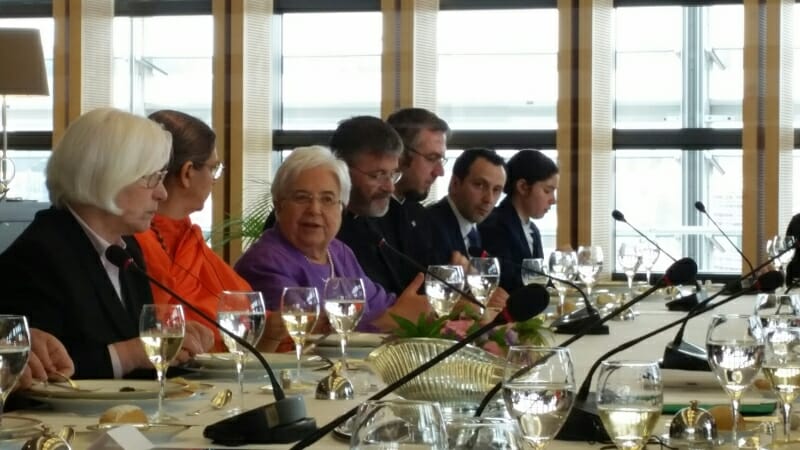
Jun 17, 2015 | Focolare Worldwide
https://vimeo.com/130879600 Video highlights of the event (Italian soundtrack) “For me dialogue is not a ritual; it is not something we do once a year and then put back on the shelf again. For me it is an essential contribution to finding solutions to some of the most difficult problems European societies are facing today, problems linked to fear of what is different, linked to the consequences of the crisis, the need for environmental sustainability. Religions will have to play the role between the communities, to perhaps help us bring Europe in a better place than it is today”. These were Frans Timmermans’ words after the annual High-Level Gathering of Religious Leaders which addressed the theme “Living together and disagreeing well”. With the First Vice-President of the European Commission were Antonio Tajani, Vice President of the European Parliament and 15 religious leaders from Christian, Jewish, Muslim, Hindu, Buddhist and Mormon traditions. An understanding of the role of religions is shown by the growing number of occasions which bring together political institutions and religious leaders. Religious leaders are invited not so much on an individual basis but so as to work together, to find solutions to conflicts and to seek a way forward towards peaceful co-existence. See the recent High Level Debate on Tolerance and Reconciliation at the United Nations, the meeting of religious leaders in Kazakhstan, the invitation to Pope Francis to speak at the United Nations and now, at European level, this meeting organised by the European Commission. Today’s event follows on from the meeting held on 2nd June with the philosophical and non-confessional organisations, and it falls within the framework laid down by the Lisbon Treaty.  Some burning issues came up at the press conference – which concern European policies on immigration, the growth of foreign fighters (those who leave Europe to fight jihad), and the rise of far right groups in the European Parliament – which were answered by Imams, Rabbis and Bishops. Metropolitan Joseph, from the Romanian Orthodox Church, also highlighted the role of ecclesial Movements, like the St Egidio Community, referring to its work for the progress of interreligious dialogue. On leaving this long dialogue, Maria Voce, President of the Focolare Movement, expressed her joy at having participated in a truly free exchange, with genuine listening. She emphasised the Golden Rule, shared by all religions. Among the examples she gave of it being put into practice was the experience of the interreligious group “Vivre ensemble à Cannes”. Outside the main meeting she said: “There is no religion that does not want dialogue, there aren’t any religious leaders who don’t seek to do all they can to promote it. This gives hope because, despite all we see around us, religion can truly bring a new message and help in the process of dialogue which can at times seem almost impossible”. She further emphasised “that it is important for communities to be involved in dialogue and not only religious leaders, to foster a synergy that can lead to a shared effort in European cities to enable peaceful co-existence. This can come about only by overcoming feelings of fear – which are understandable when facing the unknown – with feelings of welcome, respect and the capacity to welcome the other truly as a brother or sister.” The outcomes of the debate on 16th June will be included in the discussion material for the first annual conference on Fundamental Rights, of the EU, to be held on 1-2 October 2015 and which will focus on the theme: “Tolerance and respect: to prevent and combat anti-Semitic and anti-Muslim hatred in Europe”.
Some burning issues came up at the press conference – which concern European policies on immigration, the growth of foreign fighters (those who leave Europe to fight jihad), and the rise of far right groups in the European Parliament – which were answered by Imams, Rabbis and Bishops. Metropolitan Joseph, from the Romanian Orthodox Church, also highlighted the role of ecclesial Movements, like the St Egidio Community, referring to its work for the progress of interreligious dialogue. On leaving this long dialogue, Maria Voce, President of the Focolare Movement, expressed her joy at having participated in a truly free exchange, with genuine listening. She emphasised the Golden Rule, shared by all religions. Among the examples she gave of it being put into practice was the experience of the interreligious group “Vivre ensemble à Cannes”. Outside the main meeting she said: “There is no religion that does not want dialogue, there aren’t any religious leaders who don’t seek to do all they can to promote it. This gives hope because, despite all we see around us, religion can truly bring a new message and help in the process of dialogue which can at times seem almost impossible”. She further emphasised “that it is important for communities to be involved in dialogue and not only religious leaders, to foster a synergy that can lead to a shared effort in European cities to enable peaceful co-existence. This can come about only by overcoming feelings of fear – which are understandable when facing the unknown – with feelings of welcome, respect and the capacity to welcome the other truly as a brother or sister.” The outcomes of the debate on 16th June will be included in the discussion material for the first annual conference on Fundamental Rights, of the EU, to be held on 1-2 October 2015 and which will focus on the theme: “Tolerance and respect: to prevent and combat anti-Semitic and anti-Muslim hatred in Europe”.
See also: Video of Religious Leaders being welcomed Video of Press Conference Photo gallery Press Release by the European Commission Press Release by Focolare Movement (June, 12 2015)

 Estelle is the eldest of eight brothers, in a family from Ivory Coast who, after having worked as a secretary at a medical clinic in Abidjan, moved to Man in 2006 where she volunteers especially as a contact person with sponsors of a medical centre run by the Focolare Movement. When the project finished, she decided to expand her administrative skills. Meanwhile, her father died and she had to provide financial support for the family. She applied for and received a scholarship from Fraternity with Africa. Now, along with working, she is specializing through distance learning courses in “Administration of NGO organisations and non-profit associations” at university in Burkina Faso. After finishing her studies, with the support of a tutor and of AMU, she will travel to Burundi where she will complete one stage in administration and finance at CASOBU, an NGO that promotes human and community development through acitivites and projects based on the values of sharing and sustainable development. “It was a nice concrete experience for me, because it was the first time I travelled outside Ivory Coast and got to know other cultures and learn much from CASOBU; their approach to microcredit, for example. When I returned to my own country, I decided to propose that same microcredit model, beginning with the people I knew. We’ve already begun two groups that up until now seem to be functioning quite well. . .“ Everything she received, spurred Estelle to become involved in Fraternity with Africa: “When I finished my studies, I thought that since I couldn’t make a financial contribution, I could share my time and talents with the project.” So, on the one hand there was the work in adminstration, running and finances of the medical centre, and on the other hand keep up relationships, taking care of the adminstration and, from within the adminstration, she evaluates scholarship candidates and accompanies the students who receive them.
Estelle is the eldest of eight brothers, in a family from Ivory Coast who, after having worked as a secretary at a medical clinic in Abidjan, moved to Man in 2006 where she volunteers especially as a contact person with sponsors of a medical centre run by the Focolare Movement. When the project finished, she decided to expand her administrative skills. Meanwhile, her father died and she had to provide financial support for the family. She applied for and received a scholarship from Fraternity with Africa. Now, along with working, she is specializing through distance learning courses in “Administration of NGO organisations and non-profit associations” at university in Burkina Faso. After finishing her studies, with the support of a tutor and of AMU, she will travel to Burundi where she will complete one stage in administration and finance at CASOBU, an NGO that promotes human and community development through acitivites and projects based on the values of sharing and sustainable development. “It was a nice concrete experience for me, because it was the first time I travelled outside Ivory Coast and got to know other cultures and learn much from CASOBU; their approach to microcredit, for example. When I returned to my own country, I decided to propose that same microcredit model, beginning with the people I knew. We’ve already begun two groups that up until now seem to be functioning quite well. . .“ Everything she received, spurred Estelle to become involved in Fraternity with Africa: “When I finished my studies, I thought that since I couldn’t make a financial contribution, I could share my time and talents with the project.” So, on the one hand there was the work in adminstration, running and finances of the medical centre, and on the other hand keep up relationships, taking care of the adminstration and, from within the adminstration, she evaluates scholarship candidates and accompanies the students who receive them.  The medical centre in Man began in 2002, during the civil war when the hospital was closed. It was hosted in an apartment with three rooms. Then, in 2008, the current Social Medical Centre was opened with visiting rooms, one-day recovery rooms, pharmacy and laboratory. But now the number of patients has gown so much that a new centre is being constructed where diagnostic facilities will be added, and programmes for the reduction of infant malnutrition in the region of Man. There will also be training programmes for mothers, in the field of nutrition. The health situation of the people in Man is problematic. Medical bills are paid in advance and without the possiblity of riembursement. Given the poverty of the population, families are generally able to cover the cost of food and school fees. But if illness comes knocking, they only go the doctor when the illness is at its worst, and the patient is dying. The new medical centre will be able offer medical care to six thousand adult patients and three thousand children. See: AMU notizie 2/2015
The medical centre in Man began in 2002, during the civil war when the hospital was closed. It was hosted in an apartment with three rooms. Then, in 2008, the current Social Medical Centre was opened with visiting rooms, one-day recovery rooms, pharmacy and laboratory. But now the number of patients has gown so much that a new centre is being constructed where diagnostic facilities will be added, and programmes for the reduction of infant malnutrition in the region of Man. There will also be training programmes for mothers, in the field of nutrition. The health situation of the people in Man is problematic. Medical bills are paid in advance and without the possiblity of riembursement. Given the poverty of the population, families are generally able to cover the cost of food and school fees. But if illness comes knocking, they only go the doctor when the illness is at its worst, and the patient is dying. The new medical centre will be able offer medical care to six thousand adult patients and three thousand children. See: AMU notizie 2/2015






